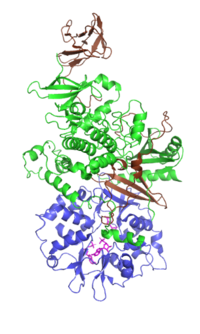
Photo from wikipedia
Glucose, chief metabolic support for cancer cell survival and growth, is mainly imported into cells by facilitated glucose transporters (GLUTs). The increase in glucose uptake along with tumor progression is… Click to show full abstract
Glucose, chief metabolic support for cancer cell survival and growth, is mainly imported into cells by facilitated glucose transporters (GLUTs). The increase in glucose uptake along with tumor progression is due to an increment of facilitative glucose transporters as GLUT1. GLUT1 prevents cell death of cancer cells caused by growth factors deprivation, but there is scarce information about its role on the damage caused by glucose deprivation, which usually occurs within the core of a growing tumor. In prostate cancer (PCa), GLUT1 is found in the most aggressive tumors, and it is regulated by androgens. To study the response of androgen-sensitive and insensitive PCa cells to glucose deprivation and the role of GLUT1 on survival mechanisms, androgen-sensitive LNCaP and castration-resistant LNCaP-R cells were employed. Results demonstrated that glucose deprivation induced a necrotic type of cell death which is prevented by antioxidants. Androgen-sensitive cells show a higher resistance to cell death triggered by glucose deprivation than castration-resistant cells. Glucose removal causes an increment of H2O2, an activation of androgen receptor (AR) and a stimulation of AMP-activated protein kinase activity. In addition, glucose removal increases GLUT1 production in androgen sensitive PCa cells. GLUT1 ectopic overexpression makes PCa cells more resistant to glucose deprivation and oxidative stress-induced cell death. Under glucose deprivation, GLUT1 overexpressing PCa cells sustains mitochondrial SOD2 activity, compromised after glucose removal, and significantly increases reduced glutathione (GSH). In conclusion, androgen-sensitive PCa cells are more resistant to glucose deprivation-induced cell death by a GLUT1 upregulation through an enhancement of reduced glutathione levels.
Journal Title: Redox Biology
Year Published: 2018
Link to full text (if available)
Share on Social Media: Sign Up to like & get
recommendations!